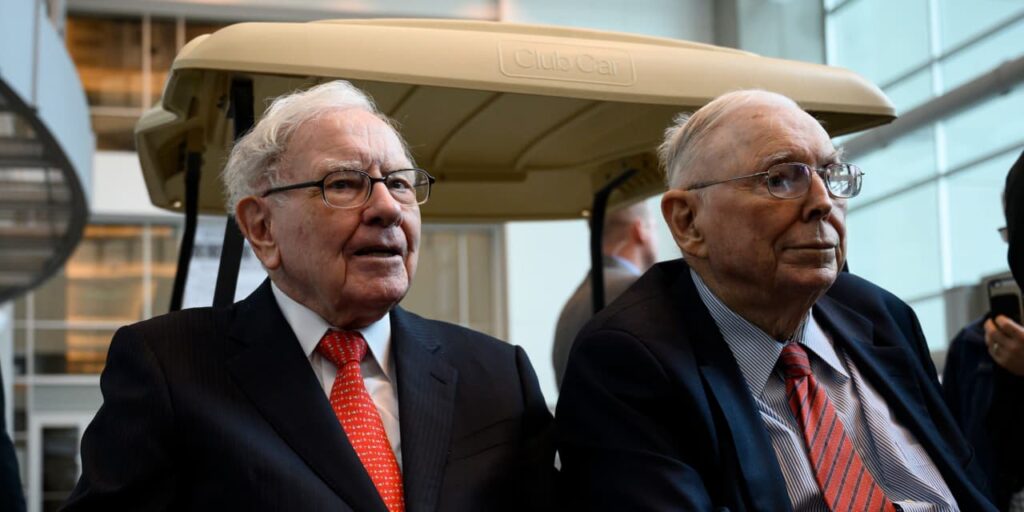Charlie Munger was a crucial partner for
Berkshire Hathaway
CEO Warren Buffett. But his death Tuesday isn’t likely to have much impact on Berkshire since the company has long been Buffett’s show.
Buffett, 93, has guided Berkshire since he took control of the company in 1965 and a sharp Buffett remains an engaged CEO today. In an interview with Charlie Rose last year, Buffett said he is “always on the clock” for Berkshire.
Munger, a Berkshire vice chairman and board member since 1978, was more a sounding board and advisor to Buffett than someone involved in the company’s day-to-day affairs.
Berkshire’s Class B stock
was down 0.4% Tuesday to $360.05. There was little market reaction to news of Munger’s death, which came just before the market close at 4 p.m. ET.
Berkshire’s leadership team includes Greg Abel, Buffett’s likely successor, who heads the company’s vast non-insurance businesses, and Ajit Jain, who oversees the insurance businesses. Both Abel and Jain have been in their roles since 2018 and Abel in particular has taken on greater responsibility in recent years.
The big changes at Berkshire will come when Buffett steps down as CEO and after his death.
The likely post-Buffett leadership team will be Abel as CEO, Jain overseeing the insurance businesses, and Ted Weschler and Todd Combs, who now run about 10% of Berkshire’s $350 billion equity portfolio, overseeing the entire investment operations. Buffett’s older son, Howard, is expected to be chairman.
Buffett controls Berkshire with a 15% stake in the company that carries about 30% of the vote since it consists almost entirely of supervoting Class A stock.
Buffett’s stake, worth some $118 billion, will go into a trust that will be administered by his three children after his death. That trust is designed to be liquidated over a decade or so after his death.
The trust’s stake will effectively protect Berkshire from activist or other outside pressure in the initial years after Buffett’s death.
Buffett has said that he thinks the stock will go up on the day after his death, rather than fall, as many surmise. His view is that investors will immediately anticipate a breakup of the company based on the view that the sum of the parts will be worth more than the whole.
Berkshire is a vast conglomerate whose largest businesses include the Burlington Northern Santa Fe railroad, Berkshire Hathaway Energy (one of the largest utility companies in the country), and a large property and casualty insurance business. Geico, the big auto insurer, is the best known piece of the insurance operations. There are dozens of other units including Shaw (carpeting and flooring), NetJets, Benjamin Moore (paints), Iscar (industrial tools), Clayton Homes (manufactured housing), and Pilot (truck stops).
Berkshire is on course to earn over $35 billion from operations after taxes this year and the company is valued at $785 billion.
Given the protection from the trust, Berkshire is likely to be insulated from outside pressure for a period after Buffett’s death.
Chris Davis, a Berkshire board member who heads investment firm Davis Advisors, told Barron’s earlier this year that the board’s role in the post-Buffett world will be to protect the company from activists and others.
“As for the future, every activist and investment banker will argue that in a world without Warren and Charlie Munger, Berkshire’s unorthodox structure shouldn’t persist. I think Berkshire is worth defending. Warren has assembled a collection of long-lived assets that will produce cash flow for decades to come.”
“If we had a Latin motto in my family, it would be the Latin for work before play. Eat your vegetables, then you get dessert,” Davis said. “Being on the board of Berkshire is a bit like getting dessert first: the chance to be with Warren and Charlie. The vegetables will come when they aren’t there, when the job of the board will be to protect this precious culture.”
In a recent letter to Berkshire shareholders outlining his plans for the disposition of his Berkshire stock after his death, Buffett wrote that Berkshire has the “right CEO to succeed me and the right Board of Directors as well. Both are needed.”
“In the short-term, Berkshire’s distinctive characteristics and behavior will be supported by my large Berkshire holdings. Before long, however, Berkshire will earn whatever reputation it then deserves. Decay can occur at all types of large institutions, whether governmental, philanthropic or profit-seeking. But it is not inevitable. Berkshire’s advantage is that it has been built to last,” Buffett wrote.
Write to Andrew Bary at andrew.bary@barrons.com
Read the full article here

